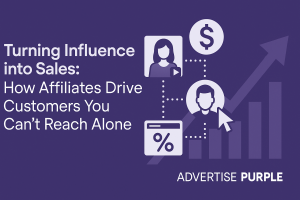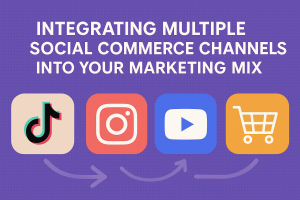
Share
What the Crumbling of Third-Party Cookies Means for Affiliate Marketing
Let’s talk about cookies. And no, I’m not referring to the sprinkle-flecked doughy delights that your local bakery sells. Although… hmm. Would an article about dessert be the worst thing in the world? No, not at all, but we’re more about affiliate marketing than we are sugary treats, so let’s stay on the right path here.
When you hear the word “cookies,” positive associations may often come to mind: mom’s house, holidays, movie marathons with friends. But those aren’t the kind of cookies we’re talking about in this article; they’re of the third-party variety and they tend to elicit fewer warm memories.
Less sweet and a little more invasive, third-party cookies have been used to collect pieces of user information that are used for tracking and advertising purposes like behavioral profiling and retargeting. In essence, they’ve been commonly used to prioritize invasive advertising experiences.
Here’s the silver lining, though: because they have a tendency to be used irresponsibly, they’re going away. Google’s announcement to start phasing out third-party cookies may be old news now, but the mass opt-out of ad tracking in Apple’s iOS 14.5 some months back is reason enough to open up the cookie jar and talk about what this means for affiliate marketing. Let’s jump right in!
What’s the difference between third-party cookies and first-party cookies?
I’ve always been a little unclear on this myself, so let’s open up a dialogue. There are two different kinds of cookies to keep in mind when we’re talking about marketing. I’ve already teased third-party cookies in the intro, but what about first-party cookies? What are those?
Here’s what I’ve learned: A first-party cookie is one that’s generated and stored by a website that you’re intentionally visiting. Whichever website it is can then collect analytics data from you and its other visitors in order to improve the user experience.
How? Via first-party cookies, websites have the ability to remember the preferences and settings of users, including language and data filled out in forms. Without these benevolent cookies, we’d have to tediously re-enter our login information and every other detail whenever we visit websites we’re often at.
Simply put, the difference between first and third-party cookies is that the former is intended to better user experiences while the latter enables intrusive ad experiences. First-party cookies aren’t going anywhere, though. It’s just third-party cookies that are under fire here.
Why are third-party cookies going away and who will be affected?
In short, third-party cookies broke the trust of consumers and website visitors by prioritizing those aforementioned intrusive and annoying ad experiences. They were constant reminders to people that their information was only being used to sell them things. Truth be told, 50% of consumers say they feel brands know too much about them and only 35% felt that marketing and advertising met their needs.
Despite that, there are a lot of marketers and advertisers who still rely on third-party cookies and the individual targeting they allow for their strategies. I mean, sure, they make it easier to reach consumers at various points in the marketing funnel, but at what cost?
Being that these cookies are phasing out, it seems to me like a great time to start looking at some new and more effective marketing and advertising strategies. And, well, that’s exactly where affiliate marketing comes in. It’s time for a wake-up call and affiliate marketing is ready to deliver.
Why is affiliate marketing poised to rise with the fall of third-party cookies?
With everything we’ve discussed so far, I’ve got another question for you. What do you think consumers might be itching for after being bombarded with the often unwanted targeted ads that third-party cookies allowed for? Peace of mind that their data isn’t being abused? Yes, of course. But also, authenticity.
With cookies out of the picture, the consumer’s need for authenticity needs to be taken seriously. Why? Because doing so will not only allow brands to build lasting and reliable relationships with their consumers but also maintain solid performance in the process. Enter, stage left: affiliate marketing.
As you might be able to guess, affiliate marketing is well-poised to deliver on consumers’ need for authentic experiences. Why? Because affiliate marketing, as it’s always done, allows brands to be seen by their ideal customers in more organic ways in environments that are natural to them. With that in mind, brands can truly deliver relevant and moment-conscious experiences in which what they’re promoting can be well-received through the content that consumers are actively choosing to see.
That, folks, is the cornerstone of authenticity. Organic, natural, and real. Affiliate marketing allows brands to meet customers where they already are without forcing anything. Not only does that deliver a message that the brands respect consumers, but that they also value their priorities and privacy.
Let’s visit an example to put this into context even more. Say there’s a nutrition brand out there that celebrates the empowerment and vitality of women. They want to put their products in front of those who truly resonate with their message and mission. So, where should they position their brand messaging? If you ask me, websites that align with their ideal consumers’ values and interests are a great option.
Sounds a lot like what affiliate marketing is all about, doesn’t it?
In this channel, consumers intentionally turn to publishers for guidance and inspiration on what to buy and why, so there’s always some level of trust there. That’s the beauty of affiliate marketing: trust is one of the most powerful forms of currency and it’s used to reach audiences in authentic ways.
—————
With everything we’ve gone over in this article, it’s more apparent than ever that authenticity is a must-have for consumers when it comes to their experiences. And why wouldn’t it be? After the trust issues that third-party cookies have instilled through invasive targeting, consumers are ready for something real.
I have to say, by investing in affiliate marketing, brands can set themselves up to be exactly that. Considering how drawn customers are to genuine experiences that speak to their passions and uniqueness, it only makes sense that affiliate marketing would poise brands for true sustainability.





